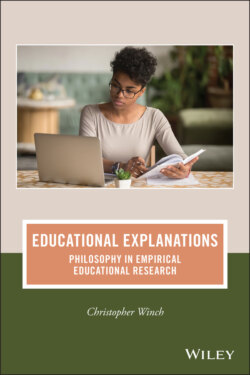Читать книгу Educational Explanations - Christopher Winch - Страница 26
PHILOSOPHICAL SCEPTICISM ABOUT EMPIRICAL EDUCATIONAL RESEARCH
ОглавлениеThis comes in five forms:
1 Scepticism about whether or not there is an educational reality.
2 Scepticism about whether we can know anything of general application about educational practices.
3 A more pragmatic scepticism about whether or not it is possible to learn anything useful from EER.
4 The idea that commonsense can tell us all we need to know about educational practices.
5 The idea that one cannot research a good through empirical means.
In practice, these positions are rarely, if ever, distinguished from each other. This means that the critique of scepticism has to make the distinctions in order to see which, if any, of the versions can be taken seriously.
Scepticism about 1 is rarely stated openly. However, it does have distinctive philosophical roots which can be found in the phenomenological approach. Phenomenology argues that although we can distinguish subjective impressions from the perception of a non-subjective order, it does not follow that there is the same order for everyone. There are in fact multiple non-objective orders, depending on the perspective of those engaged with educational practices. We have already looked at this doctrine in the previous two chapters and have found it to be incoherent. It is based on an unduly rigorous conception of what it is for a proposition to be true. When truth does not measure up to that rigorous conception, the idea of an objective truth is abandoned in favour of a truth that is related to a particular perspective.
Since we cannot determine whether or not a proposition corresponds with reality, the problem is solved by postulating a reality with which propositions can conform. That is reality seen from a particular perspective. Of course the perspective has to satisfy certain conditions before it can be taken seriously. There must be within that reality an objective succession (one that takes place irrespective of the point of viewer of the spectator) which can be coherently described which is ultimately based on the perceptions of the observer or the researcher. There must be some describable regularity about the phenomena observed; it must be possible to make meaningful predictions about what might happen and intervention and observance of the results of intervention must be possible. But we cannot infer from this that the educational reality thus described is the same for other observers or researchers using different approaches. Thus the satisfaction of these conditions does not entail that the reality thus described is the same for everyone.
At this point it is only necessary to summarise the problems with this view. First, it relies on a conception of truth as correspondence to reality which is almost bound to lead to scepticism, as a comprehensive and completely accurate account of reality will always elude us. If, however, the reality is what is directly presented to us phenomenologically (that is through our senses) that problem can be resolved, but at the cost of introducing multiple perception-dependent realities. But we have seen good reason to think that the correspondence conception of truth is not coherent. We also noted the very idea of multiple perspectives on reality suggested that there is one reality on which the perspectives are perspectives.
Very influential among philosophers of education is the view expressed in 2., that it is highly problematic to claim that we can know anything of general application about educational practices through activities of systematic enquiry.1 This is not a generalised scepticism about whether or not we can know anything about education, but rather a scepticism about the methods and deliverances of systematic empirical educational research. Commentators who have been most trenchant in expressing scepticism about EER include Charles Clark,2 Robin Barrow, David Carr and Andrew Davis. Although each of the three approaches the issue in a somewhat different manner, the general thrust of their scepticism is similar and can be characterised as follows:
1 EER relies on inadequate conceptualisation of key explanatory factors (variables). See Barrow (1984) on school effectiveness and Davis (2012) on the teaching of reading.
2 EER employs inappropriate methods of investigation and often poor designs (Barrow 1976).
3 EER’s approach to explanation is flawed.
4 EER fails to take account of contextual variation and (a variant on this) assumes stable forms of identity which do not in fact exist (Davis 2015, on the school).
5 Most EER findings turn out to be false (Carr, D. 2003).
All these reservations need to be taken seriously, and there is some justification in the concerns expressed. However, neither individually nor taken together are they fatal to the conduct of EER. It should first be stated, however, that successful EER is a difficult enterprise and educational practices do not yield their secrets easily. The history of EER is littered with hubristic attempts to provide grand theorising on the basis of inadequate conceptualisation and a small amount of empirical evidence. It is to be hoped that this phase of its development is coming to an end, but we cannot be completely confident about that.
